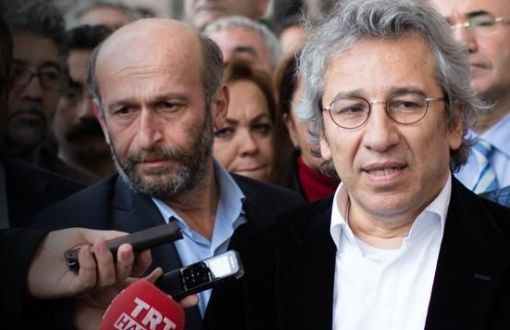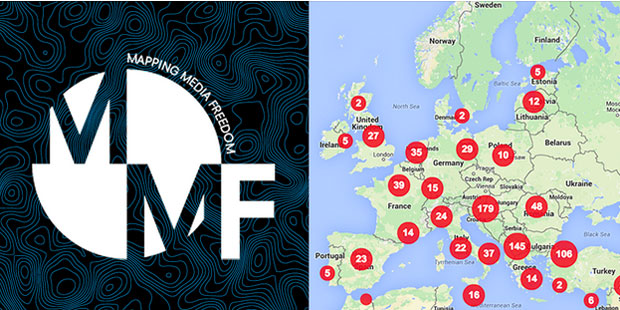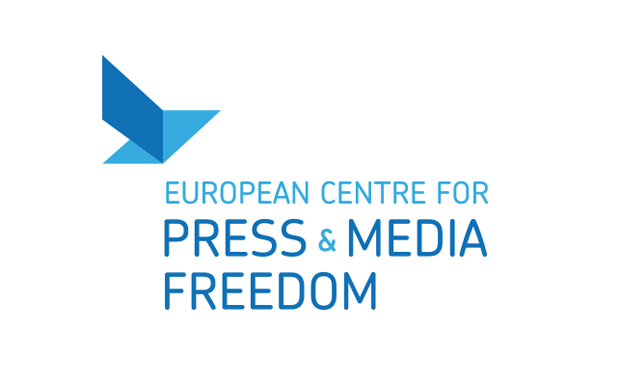27 Jan 2016 | Campaigns, Statements, Turkey, Turkey Statements

Journalists Erdem Gül and Can Dündar (Photo: Bianet)
A coalition of leading international free expression and press freedom groups condemns the Turkish government’s refusal to allow supporters to visit journalists Can Dündar and Erdem Gül, who are behind bars for reports claiming that Turkey’s intelligence agency secretly armed Islamist rebel groups in Syria, and calls for their immediate release.
Dündar, editor-in-chief of Cumhuriyet, and Gül, the newspaper’s Ankara bureau chief, are being held at the high-security Silivri Prison, west of Istanbul, reportedly awaiting trial on charges of aiding a terrorist organisation, espionage and disclosure of classified documents.
The charges remain unclear, as the defendants have not been allowed to review indictments against them. However, the case is believed to stem from a May 29, 2015 report published in Cumhuriyet that included a video purportedly showing Turkish security forces searching intelligence agency trucks en route to Syria containing crates of ammunition and weapons.
In recent years, when nearly 100 journalists were held in Turkish prisons, journalists in Turkey were often allowed to visit their imprisoned colleagues. However, in recent months, Turkey’s Justice Ministry has effectively barred most visits for both Dündar and Gül; the only visitors allowed to see them are close family members, lawyers or members of Turkey’s Parliament.
Following the Ministry’s recent refusals to respond to visitation requests put forward by journalists’ groups in Turkey and others, a coalition of 11 international free expression and press freedom defenders submitted a joint request on Jan. 8, 2016 seeking permission to visit Dündar and Gül on Wednesday, Jan. 27.
The coalition includes the International Press Institute (IPI), the Committee to Protect Journalists (CPJ), Reporters Without Borders (RSF), the International Federation of Journalists (IFJ), the European Federation of Journalists (EFJ), ARTICLE 19, Index on Censorship, the Ethical Journalism Network (EJN), PEN International, the World Association of Newspaper Publishers and News Publishers (WAN-IFRA) and the South East Europe Media Organisation.
On Jan. 22, however, Turkey’s Justice Ministry denied the request. In a response, the Ministry cited articles of statute and regulation requiring the Ministry’s permission for such a visit and indicated that the request was denied because permission to visit was not given.
The coalition condemns Turkey’s refusal to allow supporters to visit Dündar and Gül, who were held in solitary confinement for 40 days before finally being allowed to share a cell together early this month, as well as the charges against them.
The persecution of these journalists in retaliation for having reported on a matter of urgent and undeniable public interest, and the refusal to permit visitation in the manner that any other prisoner would be allowed, represent a violation of their rights and a gross abuse of authority. This wrong is compounded by the fact that neither Dündar nor Gül have been convicted of any crime, much less informed of the allegations against them.
The misuse of anti-terror law against these journalists is only the latest in a litany of such cases in Turkey, and joins a list of developments that illustrate growing authoritarianism and a blatant erosion of human rights. They include politicisation of the judiciary, the similar abuse of other criminal laws, the imposition of outright bans on disseminating certain content, the use of state agencies and economic levers to silence media outlets, verbal and – in some cases – physical attacks on critical journalists, and the orchestration of online hate campaigns targeting government critics, among others.
The coalition accordingly calls on Turkish authorities to free Dündar and Gül without delay, to drop all charges against them, and to free all other journalists currently detained in connection with their journalism or the opinions they have expressed. It further urges lawmakers in Turkey to take steps to reverse the country’s trend toward authoritarianism and urges the governments of democratic countries to pressure the Turkish government to meet its human rights commitments under domestic and international law.
-The International Press Institute (IPI)
-The Committee to Protect Journalists (CPJ)
-Reporters Without Borders (RSF)
-The International Federation of Journalists (IFJ)
-The European Federation of Journalists (EFJ)
-ARTICLE 19
-Index on Censorship
-The Ethical Journalism Network (EJN)
-PEN International
-The World Association of Newspaper Publishers and News Publishers (WAN-IFRA)
-The South East Europe Media Organisation (SEEMO)
2 Nov 2015 | Campaigns, Index Reports, Press Releases, Statements, Turkey, Turkey Reports
The International Press Institute (IPI) released a report on the Joint International Emergency Press Freedom Mission to Turkey undertaken last week by a broad coalition of international free expression and press freedom groups.
The report builds on mission participants’ finding that escalating pressure on media in the period between parliamentary elections in June and repeat polls set for Sunday has significantly impacted journalists’ ability to report on matters of public interest and is likely to “have a significant, negative impact on the ability of voters in Turkey to share and receive necessary information, with a corresponding effect on Turkey’s democracy”.
It does so through 10 brief chapters by mission participants that set forth details on main areas of concern that the participants identified in a joint declaration last week following the close of the mission. The report also contains an evaluation of the degree to which authorities in Turkey have heeded recommendations that IPI set forth six months ago in its report, “Democracy at Risk, IPI Special Report on Turkey, 2015”, concluding that authorities have largely failed to take necessary steps to remedy ongoing threats to media freedom.
“Pressure on media has continued to increase following our mission and we remain extremely concerned about the deteriorating state of press freedom in Turkey and its impact both on the Nov. 1 elections and beyond,” IPI Director of Advocacy and Communications Steven M. Ellis said. “We again call for an immediate end to all efforts to hinder or prevent journalists from giving voters in Turkey the information they need to make an informed decision about their future.”
From Oct. 19 to 21, mission participants met in Istanbul and Ankara with journalists, political representatives and foreign diplomats to demonstrate solidarity with their colleagues in the news media in Turkey and to focus attention in Turkey and abroad on the impact the growing pressure on independent media is likely to have on the Nov. 1 election.
The unprecedented mission brought together representatives from eight leading international press freedom and free expression groups, including IPI, the Committee to Protect Journalists (CPJ), Reporters Without Borders (RSF), the International Federation of Journalists (IFJ), the European Federation of Journalists (EFJ), Article 19, Index on Censorship and the Ethical Journalism Network. Delegates were also joined by members of the Journalists Union of Turkey (TGS) and IPI’s National Committee in Turkey.
The full report can be read here.
11 Sep 2015 | Campaigns, Mapping Media Freedom, mobile, Press Releases

Index on Censorship, the European Federation of Journalists and Reporters Without Borders are delighted to announce the expansion and redesign of Mapping Media Freedom, which records threats to journalists across Europe, and which will now also cover Russia, Ukraine and Belarus.
First launched in May 2014, the map documents media freedom violations throughout the European Union and neighbouring countries including the Balkans and Turkey.
More than 700 reports were logged on the map in its first year, lifting the lid on the everyday threats to media freedom that have previously gone largely unreported or undocumented.
“Mapping Media Freedom has highlighted the kinds of threats faced by media organisations and their staff everyday throughout Europe — from low-level intimidation to threats of violence, imprisonment, and even murder. Having a detailed database of these incidents – most of which previously went unreported — helps us and others to take action against the culprits,” said Index on Censorship CEO Jodie Ginsberg.
The relaunched online platform will make it easier for policy makers and activists to identify trends in media freedom and to respond efficiently with immediate assistance or to campaign on specific issues. It also provides support such as legal advice and digital security training to journalists at risk. Anyone can submit their own reports to the site for verification by project officers.
“At a time when freedom of information is facing threats not seen since the times of the Soviet Union, supporting journalists and bloggers is crucial. While part of the continent is sinking in an authoritarian drift, online surveillance has become a common challenge”, said RSF Programme Director Lucie Morillon.
Following renewed funding from the European Commission earlier this year, the crowd-sourced map incorporates new features including country filters and an improved search facility. The project also aims to forge new alliances among journalists across the continent, especially young media practitioners who will find useful resources and in depth coverage on a dedicated “Free Our Media!” page.
In reaction to new draconian measures and violence in the region, the new design coincides with an expansion into Russia, Ukraine and Belarus. All new reports from this area will be available in English and the regional language.
“The enlargement of the monitoring process to Ukraine, Russia and Belarus is good news for journalists and media workers in the region. Journalists are usually at the heart of violent demonstrations, clashes and armed conflicts where they may be shot, assaulted, kidnapped, arrested, abused and killed. They are facing difficult professional challenges between extremists or propaganda agents. Thanks to its affiliates, the EFJ will continue to document all media violations and raise awareness to end impunity when violations occur”, said Mogens Blicher Bjerregård, EFJ President.
Partners, country correspondents and affiliates to the project — including Human Rights House Ukraine, Media Legal Defence Initiative and European Youth Press — will work together to ensure the growing threats to media freedom in the region are highlighted, and tackled.
For further information please contact Hannah Machlin, project officer,[email protected], +44 (0)207 260 2671
Mapping Media Freedom
Click on the bubbles to view reports or double-click to zoom in on specific regions. The full site can be accessed at https://mappingmediafreedom.org/
|
26 Jun 2015 | Campaigns, Press Releases

Index on Censorship is delighted to announce it has joined the European Centre for Press and Media Freedom, launched this week in Leipzig, Germany, as a founder member.
The centre’s aim is to unite Europe’s media freedom community and to address media freedom violations in EU member states and beyond. Among the other founding member organisations are the European Federation of Journalists (the regional branch of the International Federation of Journalists), and the Russian Mass Media Defence Centre, as well as academic institutions from Greece to Portugal.
The centre’s work will be based on activities that promote the spirit and the values of the European Charter for Press Freedom, signed in 2009 by 48 editors-in-chief and leading journalists from 19 countries.
“Index is thrilled to be part of this initiative because of its potential to increase the impact of all media freedom campaigns in the region,” said Index on Censorship CEO Jodie Ginsberg. “We monitor threats to journalists across Europe, and it’s a fabulous asset to be able to draw more attention to these threats via the centre, to analyse trends, and then take action to address them.”
The European Centre for Press and Media Freedom was one of two projects financed by the European Commission in its latest round of funding for initiatives that address media freedom in Europe. The other was Index’s Mapping Media Freedom project, which launched as a pilot project in 2014.
Since its launch, more than 750 reports of threats to journalist and media organisations have been reported to the map.



